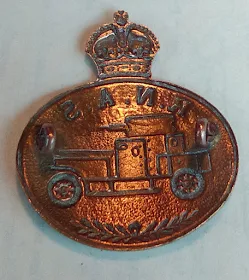Paralleling the popularity of collecting the six battalion cap badges of the World War I Royal Naval Division is collecting the affiliated insignia of the Royal Naval Air Service Armoured Car Section, which was soon expanded into a Division. This principally consists of the collar badge (“dog”), with limited variants, which are frequently mistaken and referred to as a cap badge.
As is the case with the battalion cap badges, the collar dogs have provided fertile ground for unscrupulous entrepreneurs to exploit the demand provided by beginning, as well as even advanced collectors, who have not conducted in-depth research or obtained specimens with impeccable provenance.
In assessing the authenticity of a genuine collar dog look for the following details.
• In the copy the letter “R” in RNAS is very close, if not almost touching the left hand edge of the armored car’s turret. In the originals there is a space.
• In the copy the dimpling on the front surface area of the badge is very pronounced, if not almost rough. In the originals this surface is smoother to both the touch and appearance.
• On the originals the lugs are consistently spaced, directly above the wheels and level with the top of car’s body.
• Of the originals there are apparently two types, one with voided crown, one non-voided crown, with a slight variance in size and weight:
Voided 49.32mm x 40.48mm and 52.85 g
Non voided 48.38mm x 41.72mm and 53.05 g
Non voided 48.38mm x 41.72mm and 53.05 g
A smaller size original also exists with a variance in dimensions:
One being 25mm wide x 30mm tall.
The other cited as an o/r collar, being 17.07mm x 30.55mm.
• Depending on the manufacturer’s dies there is another variance in the originals of two types; termed by some collectors as a 'Low' bonnet & tray and a 'High' bonnet & tray. As best determined this refers to the depth and curvature shown on the reverse side. Copies tend to have the high characteristic.
• Copies tend to have thin/skinny lettering, and poor definition in the crown and jewel detail.
• Originals all have lugs, not sliders.
• Originals have a rich dark matte finish in a range of shades, but certainly not a shiny or brassy appearance.
• Originals have a rich dark matte finish in a range of shades, but certainly not a shiny or brassy appearance.
Again, as is typically the case, best assurance is well established provenance.
The following three badges are classic counterfeits, because of several of the above cited details.
Based upon the same set of authenticating criteria the following badges have a high probability of being original and genuine.
The following badge is a known genuine variant, probable officer's collar dog.
The following image not only shows the badges being wore, but it also shows the man on the left wearing the distinctive ammunition pouch issued with the Webley Scott .455cal. Self-loading Pistol MkI Model 1912. Note the absence of the set of cartridge loops on the flap and the squarer shape of the pouch compared with the man on the right. See; http://arnhemjim.blogspot.com/2016/05/tell-it-to-marines.html for details.























This blog is very useful and informative. Just so I have it right is it the case that these badges were NEVER worn as cap badges ?
ReplyDeleteTo Anonymous,
ReplyDeleteTo the best of my knowledge, based upon photos and forum discussions, you are absolutely correct. Thank you very much for your interest in the blog.
Best regards,
Arnhem Jim
Arizona Territory
Another way of telling is the ruby /gem detail in the crown of all copies are detailed as a void oval. None of the originals have this detail.
ReplyDelete